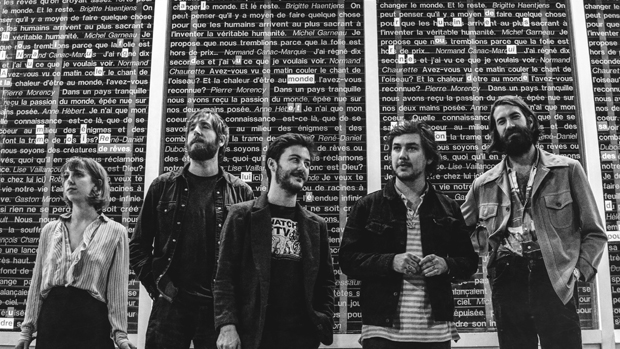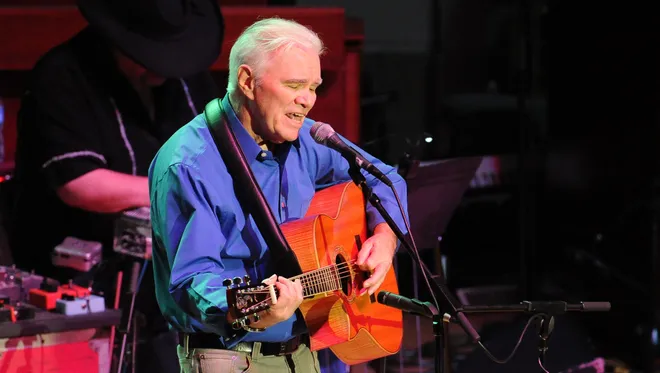
TUPELO, MISS. (TLV) – Something undeniably sincere, something pleading, and perhaps even a little bitter came through, something that rang true with the crowd when lead singer Justin Osborne of the band Susto crooned, “We’re all pilgrims, we’re all strangers, in this land we are just traveling through.”
Those listening were as used to sitting on uncomfortable wooden church pews as on uncomfortable wooden bar stools. Osborne sang as if from a pulpit, delivering the dolorous chorus of “Black River Gospel,” one of several disquietingly charming numbers on the band’s self-titled debut album to a packed house at the Blue Canoe in Tupelo, Mississippi, on October 5. A few songs later, Osborne, front man for the Charleston, South Carolina-based band, drove home the message of Southern connectedness and familiarity, singing as if he were offering a prayer at suppertime, “Your county line, ain’t far from mine.”
Susto’s sophomore album & I’m Fine Today was set to debut in January and the band was gearing up for a 17-city tour with the Denver-based folk-rock band The Lumineers as well as an appearance on Austin City Limits on October 7.

The members of Susto were endearingly and unpretentiously slovenly in appearance, with Osborne donning dark jeans and sneakers, staring out from under a tattered ball cap that shaded his kind yet sad eyes. This was the antitheses of glam rock and pop-country. The band took the stage in the same clothes in which they’d piled out of their modest touring van to scarf cheeseburgers and set up their instruments. Susto hadn’t come to swing from the rafters and explode pyrotechnics. They’d simply come to play good music for good people.
Along with guitarist and keyboardist Johnny Delaware, drummer Marshall Hudson, bassist Jenna Desmond, and guitarist and keyboardist Corey Campbell, Osborne stood on the Cathead Stage in northwest Tupelo, awash in warm, honeyed light with a cool, blue backlight. His own signature and those of his bandmates were scrawled in Sharpie on the back wall of the stage, along with scores of other bands that had visited the venue. The clichéd term “intimate setting” didn’t suffice for a place in which Osborne could literally have reached out and plucked a few succulent, dripping cheese fries from a nearby table. A slate board on the wall declared that Indian-spiced macaroni and cheese was the chef’s feature of the evening, and posters of Blues legends Howlin’ Wolf and Muddy Waters stared menacingly across the teeming front of the house.
Some lyrical sequences can’t be faked or dreamed up. They either have to be earned and paid for with life experience or they come to a songwriter in a kind of shamanistic trance. In the song “Hard Drugs,” for example, Osborne, bidding farewell to a girlfriend, with whom he was immersed in addiction, sang, “Well, I don’t care who’s asking, but you can tell em’ the truth, I’ve had longtime struggle, with substance abuse.” In later verses, the lyric changed, gratifyingly, and excruciatingly, to, “Well I don’t know who’s asking, but I can tell em’ the truth, I’ve had a real hard time, losing you.”
After the show, Osborne talked about his writing process. “All of our songs have a confessional quality,” he said. “This song was based on an ongoing relationship that I have, and maybe that’s why it resonates with people.” Although he’s no longer religious, Christianity and the piety and ceremony that are part of it occupy a big space in the landscape of his imagination, Osborne said, which explains why so many of his songs have a quasi-spiritual tenor, he said. When Osborne finished wailing the last note of “Hard Drugs,” with a flash of good-natured bravado, he titled back a pint glass of amber ale, wiped the froth from his mustache with the back of his wrist, and hollered, “Who likes the books of the late Oxford author Larry Brown?”
Susto segued into the surprisingly sprightly “Black Jesus,” with Hudson alternatively dropping his foot gently on the bass drum and tapping the high hat. “Come on, Black Jesus,” the band implored softly, in unison, as if swaying together in a robed church choir, or moaning a field chant. “Come on, Black Jesus.” After several refrains, Osborne leaped into the whispering midst with a violent admonition, shouting in a haggard, confrontational voice, “Come on, Black Jesus!” Just as suddenly, as if Osborne, caught up in the Spirit, had been taken by the arm by a demure deacon, the singer relinquished his passion, and an acoustic guitar trickled in. Like polite organ music, drowning out the sobs during an altar call, the guitar filled the void left by Osborne’s insurgent vocals. The song took on a buoyant pace as Osborne sang, almost whimsically, “I saw him on the side of a mountaintop, looking down at the people below. He said, ‘Hey ya’ll don’t you get caught up in the things that come and go.’” After the show Osborne said that the song is based on a collection of experiences he had intermingling with the black community, learning their folkways and imbibing their musical and spiritual traditions.
During a break in the set, Chris Vasquez and Jake Jones, both of Tupelo, who’d been standing in front of the stage in arm’s reach of the band, talked about Susto’s refreshing sound. “They’re true to their roots in country, yet they’re kind of an alternative, Indy-type band,” said Vasquez. Jones concurred. “It’s old-fashioned but with an urban speed to it,” he said, nodding his head and clinking his glass against Vasquez’s. “He’s vulnerable in his lyrics,” Jones said of Osborne. Jones looked over his shoulder at the band, conversing with patrons at their tables, and smiled. “I could tell they were holding back a bit,” Jones said, almost laughing. “They could really have cut it lose, but they controlled things nicely.” Jones nodded again, as if agreeing with the band’s reserve. “This is good music,” Jones said. ![]()


